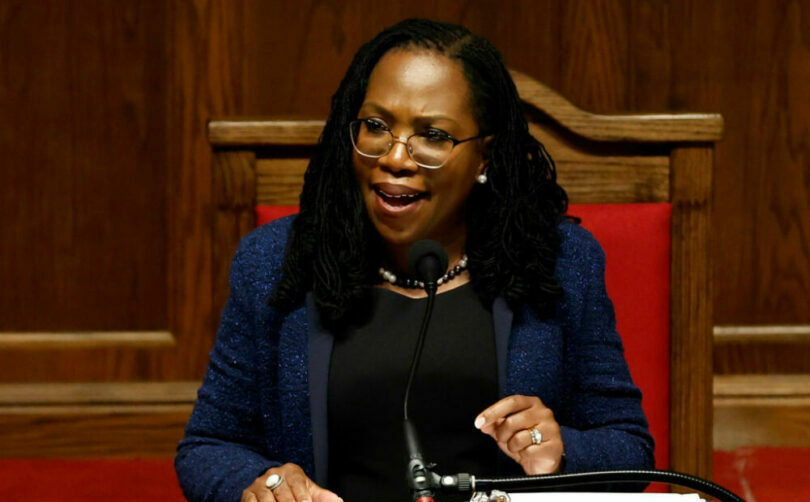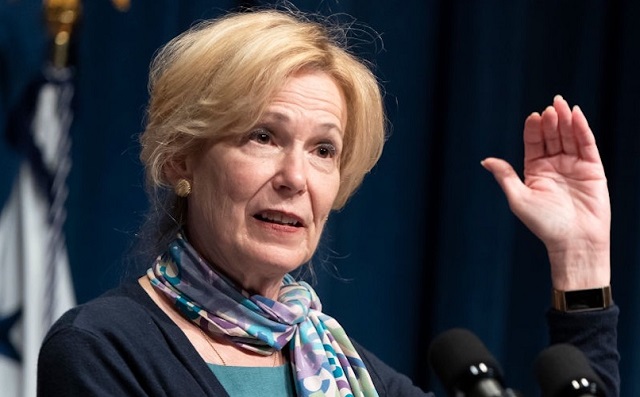International
Justice Jackson slammed for suggesting First Amendment is ‘hamstringing’ government

Supreme Court Justice Ketanji Brown Jackson
From LifeSiteNews
By Matt Lamb
Free speech advocates blasted Justice Jackson for defending government censorship efforts and criticizing conservative views about the First Amendment as ‘hamstringing the government.’
Comments made by Supreme Court Justice Ketanji Jackson during a hearing on Monday raised concerns among free speech advocates.
The Supreme Court heard arguments Monday in Murthy v. Missouri, a case concerning collusion efforts between the Biden administration and Big Tech to censor speech about topics like the integrity of the 2020 election and the dangers of the COVID jabs.
“My biggest concern is that your view has the First Amendment hamstringing the government in significant ways in the most important time period,” Justice Jackson asked Louisiana Solicitor General Benjamin Aguiñaga.
She said further:
Some might say that the government actually has a duty to take steps to protect the citizens of this country, and you seem to be suggesting that that duty cannot manifest itself in the government encouraging or even pressuring platforms to take down harmful information.
So, can you help me? Because I’m really worried about that. Because you’ve got the First Amendment operating in an environment of threatening circumstances, from the government’s perspective, and you’re saying that the government can’t interact with the source of those problems.
“Interact” refers to Biden administration officials working closely with X (formerly known as Twitter), Facebook, Instagram, and other platforms to censor speech. In one example, a Biden administration official quickly got Instagram to delete a parody account of Dr. Anthony Fauci.
The comments from Jackson drew criticism from conservatives and free speech advocates.
Missouri Attorney General Andrew Bailey said the “hamstringing” nature of the First Amendment is what makes it valuable.
“It is hamstringing, and it’s supposed to. The whole purpose of the Constitution is to protect us from the government, and the government exists to protect our rights,” Bailey told Fox News. “But here, the federal government is ignoring our First Amendment protections and weaponizing the federal government to silence our voices.
“Free speech is the fundamental lifeblood of all advocacy and even advanced civilization itself. Justice Jackson’s ‘biggest concern’ here – that the government has a duty to take steps to censor speech it deems ‘harmful’ on social media platforms – is exceedingly improper,” Title IX for All, a civil liberties group, wrote on X.
“Yes. The first amendment does limit the government. That’s the point of it,” Rick Esenberg, president of the Wisconsin Institute for Law and Liberty, wrote on X.
Charlie Kirk, president of Turning Point USA, pointed out Jackson could not define what a woman is during her Supreme Court hearing.
Jackson also earlier suggested that a “once-in-a-lifetime pandemic” could justify restrictions on free speech, essentially adopting the arguments of the Biden administration.
“I mean, I understood our First Amendment jurisprudence to require heightened scrutiny of government restrictions of speech but not necessarily a total prohibition when you’re talking about a compelling interest of the government to ensure, for example, that the public has accurate information in the context of a once-in-a-lifetime pandemic.”
Many assertions regarding COVID-19 promoted by the Biden administration have since proven to be false, including claims that COVID shots and masks stop transmission of the virus and that COVID shots are not harmful and are beneficial for children.
Health
THE WPATH TAPES: Behind-The-Scenes Recordings Reveal What Top Gender Doctors Really Think About Sex Change Procedures

 From the Daily Caller News Foundation
From the Daily Caller News Foundation
By MEGAN BROCK AND KATE ANDERSON
The World Professional Association for Transgender Health (WPATH) is the leading authority in the field of gender medicine. Its guidance is routinely used by top medical associations in the U.S. and abroad, while its standards of care inform insurance companies’ approach to coverage policies.
But behind closed doors, top WPATH doctors discussed, and at times seemed to challenge, the organization’s own published guidelines for sex change procedures and acknowledged pushing experimental medical interventions that can have devastating and irreversible complications, according to exclusive footage obtained by the Daily Caller News Foundation.
WPATH published highly influential clinical guidance called “Standards of Care for the Health of Transgender and Gender Diverse People, Version 8” (SOC 8), which recommends the use of invasive medical interventions such as puberty blockers, cross-sex hormones and sex change surgeries, calling them “safe and effective.”
The DCNF filed a series of public records requests to WPATH SOC 8 co-authors who are employed at taxpayer-funded institutions, making their emails subject to open records laws. Buried in more than 100 pages of responsive records from the University of Nevada was a series of emails between prominent WPATH members and leaders, including WPATH Global Education Institute (GEI) Co-Chair Gail Knudson, that were sent in 2022. In one email, Knudson sent a colleague the link to a folder containing nearly 30 hours of recordings from WPATH’s GEI summit in September 2022 in Montreal, Canada, which included sessions on mental health, puberty blockers, cross-sex hormones and sex change surgery.
These sessions provided WPATH members with in-depth education on the clinical application of topics addressed in the SOC 8 treatment guidelines. However, the footage reveals WPATH-affiliated doctors advocating for children to undergo risky sex change procedures and even pushing for these treatments for patients struggling with severe mental health issues. Several sessions were dedicated exclusively to treating children and included recommendations for minors to receive puberty blockers, cross-sex hormones and surgeries.
For instance, WPATH guidance recommends addressing a patient’s mental health issues before giving them sex change medical interventions. However, in one recorded session, a WPATH faculty member and gender doctor claimed that mental health issues don’t necessarily affect a patient’s ability to receive cross-sex hormones.
In another video, a doctor told attendees children should be informed that cross-sex hormones will likely make them infertile but admitted that he will prescribe them anyway if a child says they want the treatment, regardless of the future consequences.
A surgeon euphemistically referred to a phalloplasty procedure, a surgical series that includes obliterating the vaginal cavity and creating a fake penis with harvested tissue, as an “adventure” for young people. He did this despite later admitting that those same procedures will “definitely” have “complications,” such as permanent issues with bladder function and tissue death.
One physician called the entire field of cross-sex hormones “off-label,” referring to the concept of drugs being used for alternative purposes than what they were approved for. The doctor went on to say that female patients might actually appreciate drug side effects that cause them to lose hair, because they’d look “more like men.”
The Food and Drug Administration says that when it approves a drug, healthcare providers generally may prescribe that drug for an unapproved use, or off-label, when “they judge that it is medically appropriate for their patient.”
In several other videos, doctors argued in favor of transitioning patients who experience psychotic episodes. One admitted that some of his patients with schizophrenia have to be careful how much cross-sex hormones they take or they can’t “keep the voices down.”
The DCNF consulted medical professionals from respected organizations, such as Do No Harm, who all argued that the comments from WPATH-affiliated doctors show that the transgender medical industry does not have patients’ best interests at heart.
While the average person, nationally and internationally, likely has never heard of WPATH, the modern medical industry is deeply tied to the organization and relies on it to dictate the standards of care for transgender medicine. WPATH’s guidelines are cited as criteria for obtaining insurance coverage by both private insurance companies and tax-funded insurance plans, positioning them as a lynchpin of the sex reassignment industry.
Additionally, their guidelines help inform policy statements from major medical and professional organizations, such as the American Academy of Pediatrics (AAP), the American Psychological Association and the Endocrine Society. The AAP is currently being sued by Isabelle Ayala, a former patient who was medically transitioned as a child, for allegedly rushing her through sex change medical procedures.
There’s been an explosion in the number of young people, including children, being put on hormones and puberty blockers and getting sex change surgeries, according to a study published in August 2023 by the JAMA Network. This surge has been fueled, in part, by groups like Planned Parenthood, which distributes cross-sex hormones to patients as young as 16. Planned Parenthood saw a roughly 125% jump in the number of transgender services it provided between 2020 and 2022.
Twenty-three states, however, have enacted legislation preventing doctors from performing sex change surgeries on minors amid backlash from concerned parents and doctors who don’t subscribe to the WPATH-endorsed “gender-affirming care” model. Gender-affirming care is another euphemism used by medical professionals to describe the idea that doctors should affirm a patient’s wish to live as the opposite biological sex through social transitioning, hormone therapy and even surgery.
The SOC 8 was released just days ahead of the 2022 symposium and contained several significant changes to how doctors and medical institutions implemented transgender medical treatment. For instance, WPATH removed minimum age requirements criteria that established when a child can or should receive transgender medical services such as puberty blockers, cross-sex hormones, and sex reassignment surgeries.
WPATH’s previous guidelines recommended that hormone therapy be given once a patient was over the age of 16, but the updated version removed this barrier and suggests hormone therapy begin at the first signs of sexual maturity.
The videos obtained by the DCNF give the first glimpse at how doctors and mental health professionals discussed implementing the new guidelines. To highlight the most significant portions of the content obtained in the records requests, the DCNF has decided to publish a series of articles collectively called “The WPATH Tapes.”
Following this release, the DCNF intends to publish all of the videos in their entirety in order to provide the public with necessary information about WPATH’s approach to medical care and shine a light on an influential organization that has largely remained anonymous until now.
The WPATH Tapes Table of Contents:
- Video Shows Prominent Doctors Acknowledging, And Even Challenging, The Experimental Nature Of Sex Change Drugs
- Top Psychiatrist Argues Schizophrenic Patients Can Consent To Sex Change Surgeries
- ‘Keep The Voices Down’: In Unearthed Video, Doctors Discuss Putting Mentally Ill Patients, Including Kids, On Hormones
- Gender Doctor Calls Genital Surgery An ‘Adventure’ For Young People While Describing Grisly Complications
- ‘No Idea About Their Fertility’: Gender Doctors Shed Light On Grim Reality Facing Kids Considering Sex Changes
- Leader Of Gender Medicine Org Says Binary Sex ‘Doesn’t Really Hold True,’ Cheers On ‘Deconstructed’ Biology
- Private Footage Reveals Leading Medical Org’s Efforts To ‘Normalize’ Gender Ideology
Brownstone Institute
The WHO’s Proposed Pandemic Agreements Worsen Public Health

From the Brownstone Institute
BY
The WHO decided that the response for a Toronto aged care resident and a young mother in a Malawian village should be essentially the same – stop them from meeting family and working, then inject them with the same patented chemicals.
Much has been written on the current proposals putting the World Health Organization (WHO) front and center of future pandemic responses. With billions of dollars in careers, salaries, and research funding on the table, it is difficult for many to be objective. However, there are fundamentals here that everyone with public health training should agree upon. Most others, if they take time to consider, would also agree. Including, when divorced from party politicking and soundbites, most politicians.
So here, from an orthodox public health standpoint, are some problems with the proposals on pandemics to be voted on at the World Health Assembly at the end of this month.
Unfounded Messaging on Urgency
The Pandemic Agreement (treaty) and IHR amendments have been promoted based on claims of a rapidly increasing risk of pandemics. In fact, they pose an ‘existential threat’ (i.e. one that may end our existence) according to the G20’s High Level Independent Panel in 2022. However, the increase in reported natural outbreaks on which the WHO, the World Bank, G20, and others based these claims is shown to be unfounded in a recent analysis from the UK’s University of Leeds. The main database on which most outbreak analyses rely, the GIDEON database, shows a reduction in natural outbreaks and resultant mortality over the past 10 to 15 years, with the prior increase between 1960 and 2000 fully consistent with the development of the technologies necessary to detect and record such outbreaks; PCR, antigen and serology tests, and genetic sequencing.
The WHO does not refute this but simply ignores it. Nipah viruses, for example, only ‘emerged’ in the late 1990s when we found ways to actually detect them. Now we can readily distinguish new variants of coronavirus to promote uptake of pharmaceuticals. The risk does not change by detecting them; we just change the ability to notice them. We also have the ability to modify viruses to make them worse – this is a relatively new problem. But do we really want an organization influenced by China, with North Korea on its executive board (insert your favorite geopolitical rivals), to manage a future bioweapons emergency?
Irrespective of growing evidence that Covid-19 was not a natural phenomenon, modelling that the World Bank quotes as suggesting a 3x increase in outbreaks over the next decade actually predicts that a Covid-like event will recur less than once per century. Diseases that the WHO uses to suggest an increase in outbreaks over the past 20 years, including cholera, plague, yellow fever, and influenza variants were orders of magnitude worse in past centuries.
This all makes it doubly confusing that the WHO is breaking its own legal requirements in order to push through a vote without Member States having time to properly review implications of the proposals. The urgency must be for reasons other than public health need. Others can speculate why, but we are all human and all have egos to protect, even when preparing legally binding international agreements.
Low Relative Burden
The burden (e.g. death rate or life years lost) of acute outbreaks is a fraction of the overall disease burden, far lower than many endemic infectious diseases such as malaria, HIV, and tuberculosis, and a rising burden of non-communicable disease. Few natural outbreaks over the past 20 years have resulted in more than 1,000 deaths – or 8 hours of tuberculosis mortality. Higher-burden diseases should dominate public health priorities, however dull or unprofitable they may seem.
With the development of modern antibiotics, major outbreaks from the big scourges of the past like Plague and typhus ceased to occur. Though influenza is caused by a virus, most deaths are also due to secondary bacterial infections. Hence, we have not seen a repeat of the Spanish flu in over a century. We are better at healthcare than we used to be and have improved nutrition (generally) and sanitation. Widespread travel has eliminated the risks of large immunologically naive populations, making our species more immunologically resilient. Cancer and heart disease may be increasing, but infectious diseases overall are declining. So where should we focus?
Lack of Evidence Base
Investment in public health requires both evidence (or high likelihood) that the investment will improve outcomes and an absence of significant harm. The WHO has demonstrated neither with their proposed interventions. Neither has anyone else. The lockdown and mass vaccination strategy promoted for Covid-19 resulted in a disease that predominantly affects elderly sick people leading to 15 million excess deaths, even increasing mortality in young adults. In past acute respiratory outbreaks, things got better after one or perhaps two seasons, but with Covid-19 excess mortality persisted.
Within public health, this would normally mean we check whether the response caused the problem. Especially if it’s a new type of response, and if past understanding of disease management predicted that it would. This is more reliable than pretending that past knowledge did not exist. So again, the WHO (and other public-private partnerships) are not following orthodox public health, but something quite different.
Centralization for a Highly Heterogeneous Problem
Twenty-five years ago, before private investors became so interested in public health, it was accepted that decentralization was sensible. Providing local control to communities that could then prioritize and tailor health interventions themselves can provide better outcomes. Covid-19 underlined the importance of this, showing how uneven the impact of an outbreak is, determined by population age, density, health status, and many other factors. To paraphrase the WHO, ‘Most people are safe, even when some are not.’
However, for reasons that remain unclear to many, the WHO decided that the response for a Toronto aged care resident and a young mother in a Malawian village should be essentially the same – stop them from meeting family and working, then inject them with the same patented chemicals. The WHO’s private sponsors, and even the two largest donor countries with their strong pharmaceutical sectors, agreed with this approach. So too did the people paid to implement it. It was really only history, common sense, and public health ethics that stood in the way, and they proved much more malleable.
Absence of Prevention Strategies Through Host Resilience
The WHO IHR amendments and Pandemic Agreement are all about detection, lockdowns, and mass vaccination. This would be good if we had nothing else. Fortunately, we do. Sanitation, better nutrition, antibiotics, and better housing halted the great scourges of the past. An article in the journal Nature in 2023 suggested that just getting vitamin D at the right level may have cut Covid-19 mortality by a third. We already knew this and can speculate on why it became controversial. It’s really basic immunology.
Nonetheless, nowhere within the proposed US$30+ billion annual budget is any genuine community and individual resilience supported. Imagine putting a few billion more into nutrition and sanitation. Not only would you dramatically reduce mortality from occasional outbreaks, but more common infectious diseases, and metabolic diseases such as diabetes and obesity, would also go down. This would actually reduce the need for pharmaceuticals. Imagine a pharmaceutical company, or investor, promoting that. It would be great for public health, but a suicidal business approach.
Conflicts of Interest
All of which brings us, obviously, to conflicts of interest. The WHO, when formed, was essentially funded by countries through a core budget, to address high-burden diseases on country request. Now, with 80% of its use of funds specified directly by the funder, its approach is different. If that Malawian village could stump up tens of millions for a program, they would get what they ask for. But they don’t have that money; Western countries, Pharma, and software moguls do.
Most people on earth would grasp that concept far better than a public health workforce heavily incentivized to think otherwise. This is why the World Health Assembly exists and has the ability to steer the WHO in directions that don’t harm their populations. In its former incarnation, the WHO considered conflict of interest to be a bad thing. Now, it works with its private and corporate sponsors, within the limits set by its Member States, to mold the world to their liking.
The Question Before Member States
To summarize, while it’s sensible to prepare for outbreaks and pandemics, it’s even more sensible to improve health. This involves directing resources to where the problems are and using them in a way that does more good than harm. When people’s salaries and careers become dependent on changing reality, reality gets warped. The new pandemic proposals are very warped. They are a business strategy, not a public health strategy. It is the business of wealth concentration and colonialism – as old as humanity itself.
The only real question is whether the majority of the Member States of the World Health Assembly, in their voting later this month, wish to promote a lucrative but rather amoral business strategy, or the interests of their people.
-

 conflict1 day ago
conflict1 day ago‘It Makes No Sense’: Experts Puzzled By Biden Admin’s Claim That Rafah Invasion Wouldn’t Help Israel Defeat Hamas
-

 Opinion16 hours ago
Opinion16 hours agoCanada’s fertility, marriage rates plummet to record lows: report
-

 Brownstone Institute1 day ago
Brownstone Institute1 day agoMedical Elites’ Disgrace Over Ivermectin
-

 COVID-1920 hours ago
COVID-1920 hours agoFormer COVID coordinator Deborah Birx now admits jabs could have injured ‘thousands’
-

 City of Red Deer10 hours ago
City of Red Deer10 hours agoCity Council paving the way for more house suites, backyard suites, tiny homes, and duplexes
-

 Bruce Dowbiggin24 hours ago
Bruce Dowbiggin24 hours agoWhy Do The Same Few Always Get The Best Sports Scoops?
-

 Energy22 hours ago
Energy22 hours agoBuckle Up for Summer Blackouts: Wind Is Already Failing Texas in Spring
-

 COVID-191 day ago
COVID-191 day agoThe New York Times Admits Injuries from COVID-19 Shots








